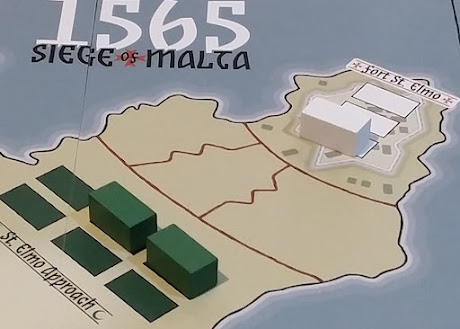I feel
like the drought has broken. T and I got together for another round of Undaunted:
Normandy (Osprey Games, 2019) on Monday, the first time since the beginning
of April. That makes game five of six. We’re slated to play the sixth game in a
fortnight. The lapse between games has been mostly due to T’s unavailability, but
I can’t be too hard on him; last week he was in Boston at a conference, and he
offered to bring some stuff back, so I took him up on the offer with a with an
order from Noble Knight Games, delivered in good order to T’s hotel, of two Vuca
Simulations games that I’m surprised didn’t put T over his luggage
allowance. The Chase of the Bismarck (2022) and Task Force: Carrier Battles in the Pacific (2023) have now joined the long list of games I hold but have yet to
play, but I’ll try to present something about each of them in the near future.
But
back to the games at hand. As mentioned, las night we got to Scenario 6: Desperate
Withdrawal. We were going to play this a few weeks ago, but T had to beg off
due to illness. Taking some care with packing it away last time, I was able to
get the scenario set up in under ten minutes – something of a record for Undaunted:
Normandy.
The
scenario is an interesting one; it seems quite unbalanced on the face of it,
with the Germans being able to field two squads, plus machine-gunners, a mortar-crew,
and a sniper, to the Americans’ two rifle squads and scouts. With the reduced
resources comes a clarity of mission. The Americans are practically adjacent to
the German riflemen at the beginning of the game, and they must traverse the
length and breadth of the board to reach safety (secured by the capture of a
victory marker), before they are both pinned. (It’s worth noting that this is
the first scenario we’ve played that uses all eighteen map-tiles.) The difficulty
for the German player is getting the resources into place to effectively
prevent both rifle squads from reaching the flag. T perhaps tried to bolster (get
into his deck, and sop potentially into play) too any units rather than
concentrating on a couple to keep his draw deck leaner. If he had ignored the
mortar and sniper and got this two machine-gunners and a scout onto the board
sooner, he would have probably been able to suppress my riflemen long enough to
get his guys up to pin both units. As it was, both my rifle squads took hits
but were both still in the game ad able to press forward (the presence in my
draw-deck of the Platoon Guide helped a lot).
Every scenario (after the first one or two) is an interesting puzzle to be nutted out. I don’t think this takes away from the game’s wargame credentials – a lot of wargames are interesting puzzles (1944: Battle of the Bulge (Worthington Publishing, 2020) springs readily to mind) – but nonetheless it works on that level as well, which is probably why so many point to the Undaunted series of games as good gateway games to wargaming. It also helps that they’re a lot of fun
In other news, I’ve been working at a medium-length campaign (twelve missions) of Aces of Valor (Legion Wargames, 2023 – at time of posting, still available from the publisher at the CPO price). I’m not quite half-way though the campaign, having just completed my fifth mission. I’m eager to review this game – there is so much to like here – but I want to get all the way through the campaign before I write it up. So far, all five missions have been at least partially successful, and in this last one I managed to take down two enemy fighters and drive off another three with some serious damage. I’ve lost one plane (in the fourth mission), but the pilot – a rookie – still managed to glide the machine back to a position behind friendly lines and hitch a ride back to our home airfield.
One of
the strengths of the game is the ability to pack it up at the end of a mission and
pull it out again when I have an hour or two to spare. It requires a little organisation
with the mission cards and the relevant counters, and I take a photo of my current
mission-point and victory-point status, but the bookkeeping isn’t too arduous.
Look for a review in a couple of weeks.
Finally,
I’ve been playing 1565: Siege of Malta (Worthington Publishing, 2022), with
the view of writing a review of this. I recently posted a review of 414BC:
Siege of Syracuse, so I was keen to revisit this one and 1759: Siege of
Quebec. For all their similarities, I’m beginning to see how radically different
the three games are in play. Dan Fournie and Maurice Suckling, the designers of
Syracuse and Malta respectively, are no slouches, and have each managed to
create a game experience that is superficially similar to Siege of Quebec, but
that offer radically different challenges. Look for this review soon as well,
but not too soon, as my wife and I are taking a well-earned break and visiting some
interstate friends for a few days. Regular transmission will return next week.


.jpg)

.jpg)






No comments:
Post a Comment